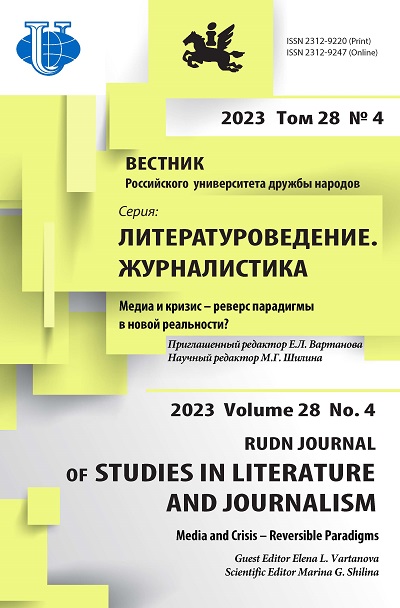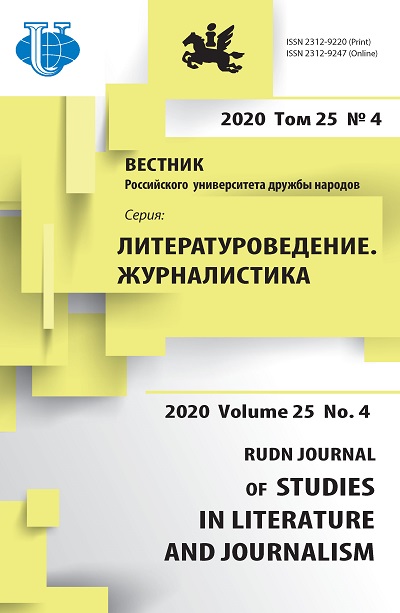The genesis of Russian electoral PR: issue of periodization
- Authors: Shilina M.G.1, Mintusov I.E.2
-
Affiliations:
- Plekhanov Russian University of Economics
- Saint Petersburg State University
- Issue: Vol 25, No 4 (2020)
- Pages: 756-765
- Section: JOURNALISM
- URL: https://journals.rudn.ru/literary-criticism/article/view/25460
- DOI: https://doi.org/10.22363/2312-9220-2020-25-4-756-765
Cite item
Full Text
Abstract
In modern Russia, the electoral PR practices make up a significant share in the national public relations structure but have not been systematically studied until now. The directions of communication activities, the object-subject area, as well as the problems of genesis, which is the basis of research in each subject area, have not been systematically studied yet. The research problem is determined by the lack of sufficient novelty and specificity of empirical material, the lack of significant theoretical and methodological foundations and concepts. For the first time in the Russian scientific discourse, the paper presents the definition of electoral PR as a communication process and determines the features of its genesis from the late 1980s to 2014 in the Russian public relations formation context. On the basis of the structural-functional and model approaches, the characteristics, structure, models, messages, functions, and parameters of electoral PR institutionalization are fixed. For the first time, the paper presents the elements, the new subjects of the electoral PR communication models in the Russian Federation. The proposed author's PR periodization methodology is relevant for the electoral public relations periodization as well. The legal regulation of the electoral process as one of the basic conditions for the transformation and periodization of electoral PR is mentioned. The revealed characteristics of the genesis of Russian electoral PR make it possible to record the incompleteness of the process of its institutionalization by the mid-2010s. The presented methodological grounds for studying elective public relations seem to be basic for further research in this area.
About the authors
Marina G. Shilina
Plekhanov Russian University of Economics
Author for correspondence.
Email: SHilina.MG@rea.ru
Doctor of Philology, Professor at the Chair of Advertising, Public Relations and Design
36 Stremyannyi Lane, Moscow, 115093, Russian FederationIgor E. Mintusov
Saint Petersburg State University
Email: mintusov@nikkolom.ru
Associate Professor of the Graduate School of Journalism and Mass Communications
26 1st line of Vasilievsky Island, Saint Petersburg, 199034, Russian FederationReferences
- Grachov, M.N. (2004). Politicheskaya kommunikatsiya: Teoreticheskiye kontseptsii, modeli, vektory razvitiya [Political communication: Theoretical concepts, models, vectors of development]. Moscow, Prometej Publ. (In Russ.)
- Grinberg, T.E. (2019). Tendentsii razvitiya izbiratel'nykh kommunikatsiy: Elektoral'nyye issledovaniya, strategii, internet-tekhnologii [Trends in the development of electoral communications: Electoral studies, strategies, Internet technologies]. Rossiyskaya shkola svyazey s obshchestvennost'yu [Russian school of public relations], (14), 47–58. (In Russ.)
- Grunig, E.J., & Hunt, T. (1984). Managing Public Relations. New York, Holt, Rinehart & Winston.
- Shishkina, M.A. (2002). Pablik rileyshnz v sisteme sotsial'nogo upravleniya [Public relations in the system of social management]. Saint Petersburg, Pallada-media; RUSICH Publ. (In Russ.)
- Krivonosov, A.D., Filatova, O.G., & Shishkina, M.A. (2018). Osnovy teorii svyazey s obshchestvennost'yu [Fundamentals of public relations theory]. Saint Petersburg, Piter Publ. (In Russ.)
- Shilina, M.G. (2012). Tekstogennyye transformatsii infosfery. Metodologicheskiy eskiz stanovleniya Interneta [Textogenic transformations of the infosphere. Methodological sketch of the Internet formation]. Moscow, RIC “Severo-Vostok” Publ., HSE University. (In Russ.)
- Gorokhov, V.M., & Shilina, M.G. (2019). Genezis i sotsial'naya sushchnost' svyazey s obshchestvennost'yu [Genesis and the social essence of public relations]. Mediaskop, (4). (In Russ.) doi: 10.30547/mediascope.4.2019.5.
















